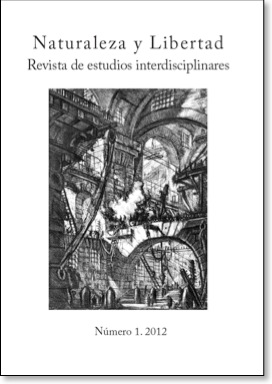Los ‘Anales de Física’ de L.W. Gilbert y su influencia en la Naturphilosophie de Schelling y Hegel
DOI:
https://doi.org/10.24310/nyl.v1i1.3978Keywords:
Gilbert, Hegel, Schelling, Naturphilosophie, Física, Quimismo, Dialecti¬cidad, Aufhebung, el Sistema de Jena, manuscritos de 1803/04, Románticos, Origen de la revista científica alemana (Annalen der Physik), últimos flogistas alemanes,Abstract
Resumen: Presentamos a Ludwig Wilhelm Gilbert, editor de la prestigiosa revista científica de Halle y Leipzig los Annalen de Physik. Cuando en torno a 1800 inició esta serie, todavía subsistía en las universidades alemanas la química del flogisto, y muchas traducciones suyas de los avances de la École Polytechnique y del círculo de Manchester anticiparon el cambio de paradigma de la nueva química y la llegada del atomismo con sus nuevos elementos. Ésta fue la tópica de fondo mientras las facultades de Filosofía impartían una nueva asignatura, la Naturphilosophie. Apuesta innovadora que Goethe favoreció en Jena, aunque pretendía también rivalizar con la trayectoria más severa y tradicionalista de la Escuela de Minas de Freiberg. Un desconocido Hegel se inició en la universidad de Jena enseñando esta materia bajo el padrinazgo de Schelling. Pero pronto Hegel se desmarca de él interiorizando las críticas que la revista de Gilbert estaba lanzado contra Schelling y sus seguidores, los románticos Naturphilosophen. La “raíz común” en el finalismo de la Crítica del Juicio, el esquematismo fichteano o la autosuficiencia del Yo y la intuición intelectual en Schelling, dejaban abierta una evasiva mística que impedía a la ciencia su pronunciamiento, justamente en un momento en que la ciencia había rebasado ya con la química los límites mecanicistas de la razón pura ilustrada. Hegel supo ver este cambio de fase y este choque generacional. El vocabulario especulativo que luego le hará célebre en Berlín, Aufhebung, absoluto y dialecticidad, lo acuñó Hegel en estos semestres de Jena y sobre esta tópica de la naturaleza, cuando extractaba para el manuscrito de sus clases los descubrimientos de Winterl, Berthollet, Dalton, Prévost o Erxleben, y seguía las críticas de británicos como Chenevix o Guyton de Morveau contra los románticos alemanes. Concluye, así, que las nuevas leyes de la lógica deben reflejar el estado actual de la Física, así como la racionalidad los nuevos acontecimientos de la Historia americana y europea.
Palabraz clave: Gilbert, Hegel, Schelling, Naturphilosophie, Física, Quimismo, Dialecticidad, Aufhebung, el Sistema de Jena, manuscritos de 1803/04, Románticos, Origen de la revista científica alemana (Annalen der Physik), últimos flogistas alemanes, investigadores de la École Polytechnique, Berthollet, Winterl y Chenevix
Abstract: We introduce the editor of Annalen der Physik (Leipzig). He is a defender of the new antiflogist French chemistry when, in around 1800s, the old methods still existed: in Gotinga, for example, Lichtenberg. With this in-depth topic, the Faculty of Philosophy presents a new subject, the Naturphilosophie. It was a proposal which Goethe favoured competing with Freiberg’s Mine School. Hegel began in Jena University teaching this subject under Schelling’s patronage. But soon he disassociated from him by familiarazing with the criticism that Gilbert’s magazine was hurled against Schelling and the Romantics. Later remarkable term such as Aufhebung, Absolute and dialectialism, coined by Hegel in those years summarizing Dalton, Chenevix, Winterl, Guyton, Berthollet, Fischer, Ritter and Steffens’s articles, from Gilbert’s magazine. Against the aesthetic/mystic evasion of the kantianism or the intellectual intuition according to Fichte and Schelling, Hegel reaffirms a new Logic reflection of the Physics of his time (neither mechanic nor illustrated) just as the rationality will be in the History that he lives.
Key words: Gilbert, Hegel, Schelling, Natural Philosophy, Physics, Chemical Synthesis, Dialectic, Aufhebung, the system of Jena, manuscripts from 1803/04, Romantics, the birth of the German scientific periodical (Annalen der Physik), the last German flogistic chemists, researchers of the polytechnic school, Dalton and the Manchester School, Berthollet, Winterl y Chenevix.
Recibido: 21/02/2011. Aprobado: 10/12/2011.
Downloads
Metrics
Downloads
Published
How to Cite
Issue
Section
License
Those authors who have publications with this journal, accept the following terms:
1. Copyright and licensing information are clearly described on the journal’s web site: all content published in Naturaleza y Libertad is open acces without limit, and are subject to the Attribution-NonCommercial-ShareAlike 4.0 International (CC BY-NC-SA 4.0) license. The full text of which can be consulted at https://creativecommons.org/licenses/by-nc-sa/4.0/
2. It is the responsibility of the authors to obtain the necessary permissions for the images that are subject to copyright. The authors whose contributions are accepted for publication in this journal will retain the non-exclusive right to use their contributions for academic, research and educational purposes, including self-archiving or deposit in open access repositories of any kind. The electronic edition of this magazine is edited by the Editorial de la University of Malaga (UmaEditorial), being necessary to cite the origin in any partial or total reproduction.
3. This journal allows and encourages authors to publish papers on their personal websites or in institutional repositories, both before and after their publication in this journal, as long as they provide bibliographic information that accredits, if applicable, your posting on it.
4. In no case will anonymous papers be published.





18.png)













